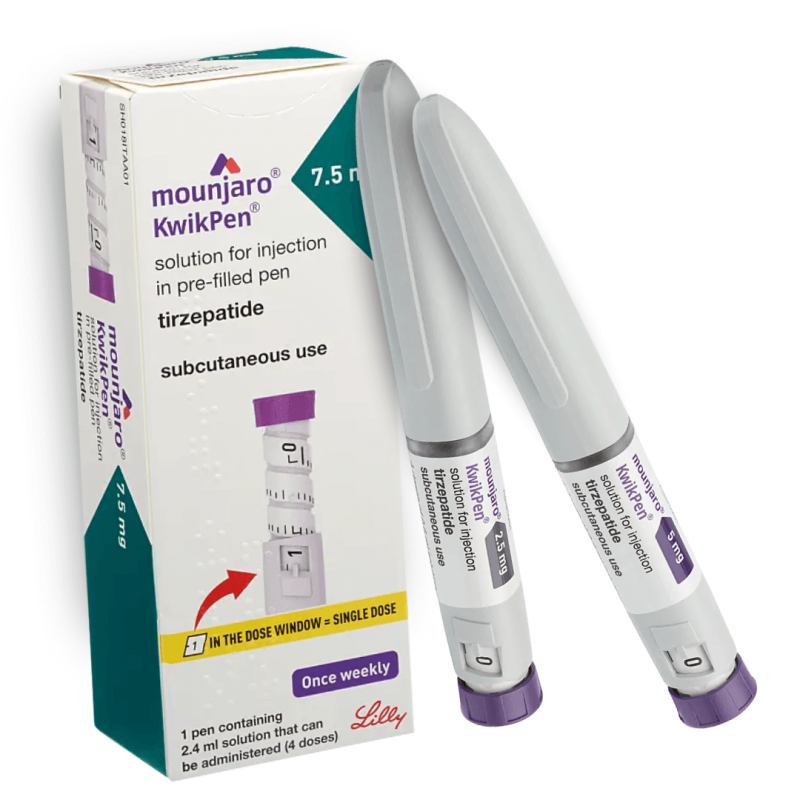Mounjaro (tirzepatide) is an injectable medication that is administered once a week. It was initially developed to help manage blood sugar levels in people with type 2 diabetes. However, recent clinical studies have demonstrated that it can also be highly effective for weight loss in individuals who are overweight or obese.
This medication works by mimicking natural hormones in your body that help increase feelings of fullness and satiety. As a result, you may experience a reduced appetite, which can lead to eating smaller portions and consuming fewer calories. Additionally, Mounjaro helps to slow the emptying of your stomach, further helping to suppress your hunger and support weight reduction.
While it is primarily used for managing diabetes, many patients are now using Mounjaro specifically for weight loss under the supervision of a healthcare professional. It’s important to use this medication only as prescribed, as it can cause side effects such as nausea, vomiting, diarrhea, or constipation. In rare cases, it may also increase the risk of more serious health issues like pancreatitis.
Before starting treatment, our Pharmacinta Clinical Team will evaluate whether Mounjaro is suitable for you based on your overall health and medical history. Always follow your provider’s instructions carefully, and report any side effects or concerns promptly during your treatment. This medication works best when combined with a healthy diet and regular physical activity, supporting your weight management goals.
Remember, never adjust your dose or stop taking the medication without consulting your healthcare professional. Using Mounjaro responsibly under medical guidance can help you achieve your health and weight management objectives safely.
Mounjaro (tirzepatide) should be used exactly as prescribed by our Pharmacinta Clinical Team. It is typically administered once a week, on the same day each week, at the dosage recommended by your clinician. Consistency in the timing helps ensure the medication works effectively.
The dosage titration of the drug, is designed to minimise side effects. Starting with Mounjaro 2.5mg, and moving up through 5mg in 2.5mg increments, helps the body adjust to the drug's impact. Doing this gradual titration, will allow you to minimise side effects and get the most out of your treatment.
Before each injection, wash your hands thoroughly with soap and water. Prepare the injection site, usually an area of your abdomen, thigh, or upper arm. Clean the skin with an alcohol wipe and allow it to dry completely to prevent infection.
The medication should be injected just under the skin (subcutaneously). Use the pre-filled pen or syringe as instructed, and do not inject into your veins or muscles. When administering the injection, rotate the injection site each week to prevent skin irritation.
If you miss a dose, take it as soon as you remember within the same week. If it is nearly time for your next scheduled dose, skip the missed dose and continue with your normal schedule—do not take a double dose to catch up. Store the medication in a refrigerator, as directed, and keep it out of reach of children.
Always follow your healthcare provider’s specific instructions regarding dose and injection technique. If you have any questions or experience any side effects, contact your healthcare professional promptly for guidance.
Common side effects of Mounjaro may include nausea, which is often the most frequently reported. Some patients may also experience vomiting, diarrhea, or constipation. These gastrointestinal symptoms are generally mild to moderate and tend to improve over time as the body adjusts to the medication.
Some individuals might experience decreased appetite and weight loss, which are often desired effects but can sometimes lead to nutritional deficiencies if severe or persistent. It is important to monitor your body's response and discuss any significant weight changes or discomfort with your healthcare provider.
In rare cases, Mounjaro can cause more serious side effects. These include symptoms of pancreatitis such as severe abdominal pain that may radiate to your back, nausea, and vomiting. If you notice these symptoms, seek medical attention immediately.
Other less common but serious side effects can include allergic reactions, which may present as rash, itching, swelling, dizziness, or difficulty breathing. If you experience any of these symptoms, seek emergency medical help right away.
Always inform your healthcare provider promptly if you experience any side effects, especially if they worsen or do not resolve. They can provide guidance on how to manage them and determine if the medication should be discontinued.
Mounjaro should be used with caution in individuals with a history of pancreatitis, as the medication may increase the risk of developing this condition. Patients with severe gastrointestinal disorders or those prone to nausea and vomiting should discuss their medical history thoroughly with their healthcare provider before starting treatment. It is also important to inform your provider if you have any kidney or liver problems, as these conditions may affect how you respond to the medication.
Mounjaro is not recommended for use in people with a personal or family history of medullary thyroid carcinoma (a type of thyroid cancer) or in patients with Multiple Endocrine Neoplasia syndrome type 2, due to potential risks. Pregnant or breastfeeding women should consult their healthcare professional before beginning treatment, as safety during pregnancy and nursing has not been fully established.
Patients should be aware that this medication can cause hypoglycemia (low blood sugar), especially if combined with other diabetic medications, so blood sugar levels should be monitored regularly. Additionally, because the medicine can cause gastrointestinal side effects, starting treatment at a low dose and gradually increasing it may help minimize these effects. Always follow your healthcare provider’s advice regarding dosing, and inform them of any other medications or health conditions you have to prevent potential interactions or complications.





